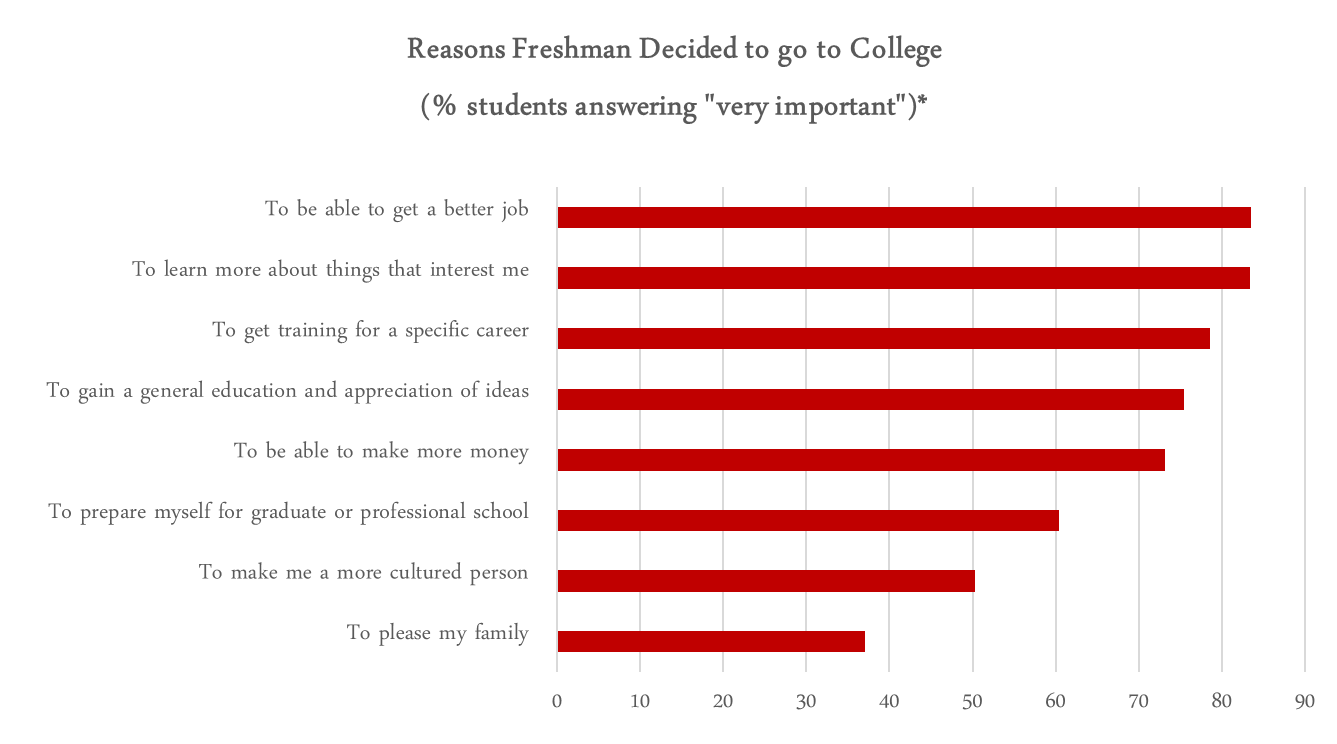Each day brings new articles, blogs, and op-eds about whether students should return for the 2020-2021 school year. Students, particularly incoming freshman, are reconsidering their educational plans—should they be prepared for fully remote learning, hybrid, in-person? If their institution is considering in-person learning, what facilities will be open to them? Will they need to pay full tuition for a hybrid or remote learning experience? Should they consider a gap year, in hopes a COVID-19 vaccine will be available in the coming months, and put off their 4-year degree?
But are these even the right questions to be asking? Why not instead consider whether a 4-year degree is even the right fit?
First, let’s look at why students go to college. According to the Cooperative Institutional Research Program, which has surveyed incoming college freshman for 40+ years (on this and other topics of interest), the #1 reason is “to be able to get a better job.” That’s not at all illogical—it stands to reason that if you can get a better job, you’re likely better positioned to achieve higher earnings throughout your life, and in general, feel more financially stable.

*Graph created using data taken from: Bara Stolzenberg, et. al. (2019). The American Freshman: National Norms Fall 2019 (The Cooperative Institutional Research Program at the Higher Education Research Institute at UCLA, 2019.) Retrieved from: https://www.heri.ucla.edu/monographs/TheAmericanFreshman2019.pdf
However, the freshman class of 2019 also reported an increased level of financial concern—not surprising, given the cost of a college degree skyrocketed more than 25% in the past 10 years. Student loan debt now sits at an ugly $1.6 trillion. Though there are a lot of (mostly valid) factors[1] that go into why a degree costs what it does, that cost is primarily passed to students, many of whom either won’t be able to afford the price of a 4-year degree, or who are averse to spending the rest of their life paying for it (especially if that degree is now remote).[2], [3]
And while there’s no denying that education beyond a high school diploma makes a significant difference in lifetime earnings, more and more major companies—even the U.S. government, to some extent—no longer even require a traditional degree.
Even more importantly, we have to think about the actual outcome for incoming freshman. As Meg St-Esprit, writer for The Atlantic, says, “the rigidity of this narrative could lead parents and students alike to be shortsighted as they plan for their future careers. Yes, many college graduates make more money—but less than half of students finish the degrees they start.”
We’ve at least partially debunked the idea that all kids that opt for college are going to make more money long-term. So, what about the other reasons? In at least one case, a 4-year degree really IS irreplaceable—e.g., you typically can’t go to graduate school without having first completed a bachelor’s degree. But as for the others…well, those goals can be met in other ways. It’s time to let go of the stigma of opting out of the 4-year experience, and instead embrace the many other viable alternatives available.
Community College: Don’t Believe the (Negative) Hype
While pop culture would have you believe differently, there are a lot of incredibly good reasons that graduates might instead choose to attend a community college—significantly lower cost, a more gradual transition to college and subsequently adult life, more flexible class schedules, smaller class sizes, and some additional time to consider what course of study to ultimately pursue. If a student does later decide to go on to a 4-year institution, many states have programs designed to make the transfer process easier.
On the cost front, in particular, students who qualify can greatly benefit from one of the several free tuition programs that have cropped up in recent years. Connecticut made news earlier this year when it went ahead with its statewide PACT plan, offering free community college tuition to all first-time students, even in the midst of the pandemic and associated economic recession.
Trade School
Like community colleges, cost and length of program (typically 2 years) is less than that of a 4-year degree. Unlike 2- or 4-year degree programs, however, trade schools provide an experience designed to give students specialized skills that allow them to join the workforce sooner. Unrelated generals aren’t part of the program, meaning students get a more focused education suited to their specific interests and needs (e.g., web development, dental hygiene, electrical, plumbing, etc.). Trade schools also provide the benefits of hands-on training, flexible start dates, smaller class sizes, and job placement.
Apprenticeships/Job Training Programs
Though only 3% of Americans have completed apprenticeships, these paid career-training programs are gaining an increasing amount of attention as a good way for workers to advance their on-the-job skillsets. In this model, workers learn necessary skills through a combination of classroom instruction and hands-on experience. However, apprenticeships are limited, and as a result, competition is high.
Micro-Credentials or Certifications
An increasingly popular option is self-paced, online courses or credentials which are a great option for both working adults (upskilling or newly added skills can provide opportunities for advancement) and recent high school graduates, who can try out different courses while considering the many paths available to them. Another feature of online courses is that a user who later opts to complete a 4-year degree may be able to prove proficiency and test out of certain classes required for a degree program.
There’s an increasing number of programs available, many with a high degree of flexibility in terms of both pricing and timing. Many programs are self-paced, and students have the ability to choose from a variety of pay structures—free, monthly, or yearly, depending on the provider and whether a formal certificate of achievement is desired. Some of the better-known options include:
Coding Boot Camps
For those interested in IT or computer science, coding bootcamps are a great option.[4] These short (but intense) training programs are typically less than four months (some coding bootcamps are as short as six weeks), and are a fraction of the cost of a traditional degree (however, it’s also important to note that there is no federal student aid available for bootcamps, as they aren’t subject to government oversight, but rather are offered by private companies). Bootcamps also offer key flexibility: students can opt for part-time, full-time, or self-paced and can opt for in-person or fully online. And like apprenticeships, many bootcamps offer assistance in job placement upon completion. Still, these bootcamps are not for the faint of heart—it’s a commitment to a very specific field, so students need to be sure this is what they want to do going in.
These 5 alternatives to the 4-year degree are only a few of the many options now available. The important thing for learners of all ages to keep in mind is that there isn’t a single path that fits all needs—and that’s perfectly okay. Just as we evolved to believe the pinnacle of post high school education was the 4-year (or advanced) degree, so too must we evolve to break out of that now outdated mindset.
Have any thoughts or want to talk to the author of this post? We’d love to hear from you! Email the author (marketing@luminad.com) or learn more about Lumina Datamatics.
.
Sources:
The Pros & Cons of Community Colleges. Retrieved from https://www.scholarships.com/resources/college-prep/choosing-the-right-school/the-pros-and-cons-of-community-colleges/
Relay. (2019, March 28). 7 Pros and Cons of Community College, From Cost to Classes to Campus Social Life. https://www.huffpost.com/entry/community-college-pros-and-cons_l_5c938c86e4b01b140d365a30
Imagine America. (2019, March 8). The 8 Benefits of Going to a Trade School. Retrieved from https://www.imagine-america.org/8-benefits-going-trade-school/
Hubley Luckwaldt, J. (2019, November 20). The Best Jobs for Trade School Graduates. Retrieved from https://www.thebalancecareers.com/best-trade-school-graduate-jobs-4125189
Horn, M.B. (2019, May 14). The Disruptive Playbook for Coding Bootcamps to Upend Universities. Retrieved from https://www.forbes.com/sites/michaelhorn/2019/05/14/the-disruptive-playbook-for-coding-bootcamps-to-upend-universities/#8767a7452319
[1] Most notably, decreased state funding, dwindling endowments, increased campus amenities, technology upgrades, rising faculty salaries, etc.
[2] For an up-to-date list of fall 2020 reopening plans, see the excellent College Crisis Initiative (C2i) @Davidson College dashboard.
[3] While some institutions are in fact offering rebates and reversals, others, such as Harvard, are not only not offering a discount, but are instead increasing tuition for the 2020-2021 school year.
Bara Stolzenberg, et. al. (2019). The American Freshman: National Norms Fall 2019 (The Cooperative Institutional Research Program at the Higher Education Research Institute at UCLA, 2019.) Retrieved from: https://www.heri.ucla.edu/monographs/TheAmericanFreshman2019.pdf
[4] Though there are bootcamps for other subject areas, such as photography, coding remains the most prevalent by far.





0 Comments